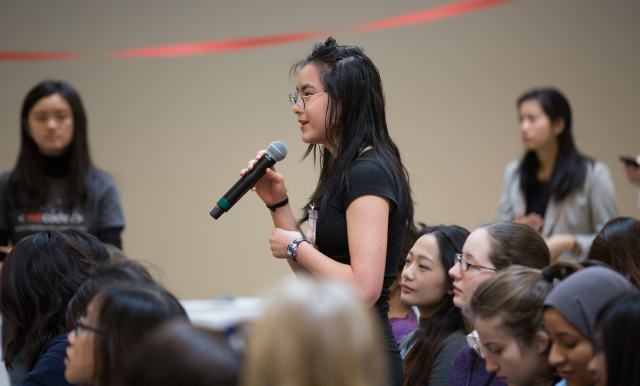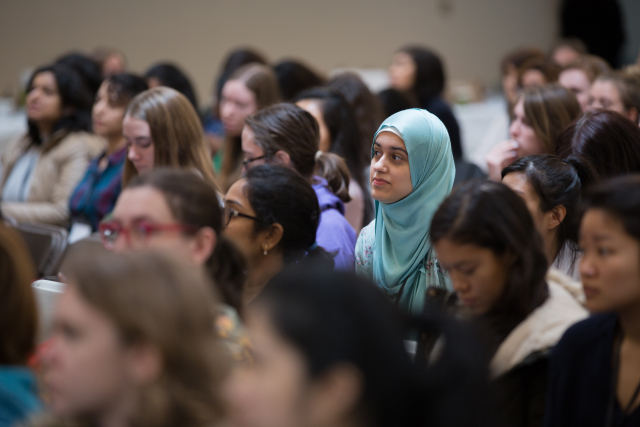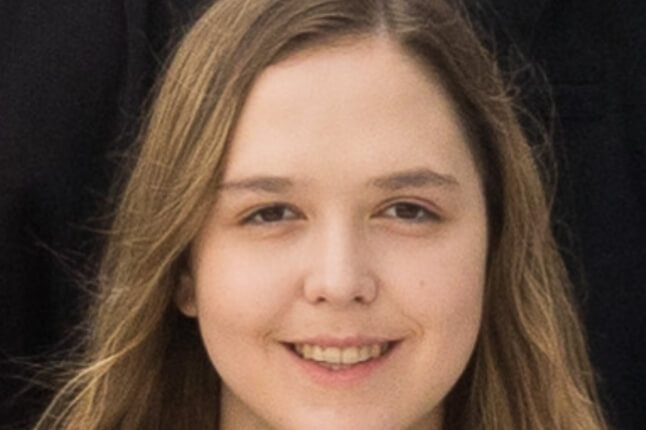News
WECode keynote speaker Jess Lee, a partner at Sequoia Capital, advised attendees to build strong bonds with their fellow women in computer science. (Photo by Richard Tong)
“I don’t like the word networking. It’s not about meeting as many people as possible. Instead there’s a graph you’re building, a smaller network but with stronger bonds between the nodes,” explained Jess Lee, former CEO at Polyvore and current partner at Sequoia Capital.
The WECode Conference’s first keynote speaker summed up the outcome of the weekend—students, professionals, and leaders in business coming together to learn, connect, and form genuine bonds stemming from a mutual passion for computer science and for continued expansion and inclusion in the field.
WECode, a conference organized by the Harvard John A. Paulson School of Engineering and Applied Sciences student group Women in Computer Science, is dedicated to expanding the skills, network, and community of technical women worldwide. The fifth annual conference hosted 700 attendees and four keynote speakers, along with several panels, tech talks, fireside chats, workshops, and socials on March 3 and 4.

A WECode attendee asks a question during Lee's keynote presentation. (Photo by Richard Tong)
Other keynote speakers included Pamela Rice, head of technology strategy and innovation labs engineering at Capital One, Chieko Asakawa, a researcher at IBM, and Ruthe Farmer, an activist and policy maker supporting women in technology.
Discussions and workshops led by women in tech ranged from the highly technical, such as “Supercomputing Biochemistry in Space and Time,” to the highly practical, like “The Soft Side of Recruiting.”
Kate Vrendenberg, a Ph.D. student in philosophy at Harvard, presented a talk on the problems with machine learning and ethics, asking if data is the antidote to discrimination when personal bias can still be encoded from non-representative sampling and historical data. When the audience was called upon to brainstorm solutions, Rory Cramer, a software engineer working in Cambridge, responded, “We have to convince companies that ethics are important to their business. We need women and women of color to be writing and changing potentially biased code.”
When asked why she wanted to attend the conference, Cramer said, “I want to see more women in my work place. I want to see my company and others be more conscientious consumers.”
In another talk, Saqi Mehta, associate director for employer relations and diversity engagement at Tufts University, focused on practical ways to get hired into the company where you belong. Mehta’s advice: think about what you want, ask what products and services align with your values, be your own brand, network, and seek mentorship
Between the career advice, opportunities to meet in small groups with leading women in computer science, and social time to make friends from across the country, the WECode Conference offered takeaways for every attendee.
Celina Qi, A.B. ’19, a neurobiology concentrator and member of the WECode board, explained why she decided to join the team.
“I attended the conference last year, and found it is an amazing way for students to see what female professionals in the tech field look like, and to learn how they deal with the glass ceiling,” she said.

The fifth annual WECode Conference hosted 700 attendees and four keynote speakers, along with several panels, tech talks, fireside chats, workshops, and socials on March 3 and 4. (Photo by Richard Tong)
Topics: Computer Science, Diversity / Inclusion, Events
Cutting-edge science delivered direct to your inbox.
Join the Harvard SEAS mailing list.
Press Contact
Adam Zewe | 617-496-5878 | azewe@seas.harvard.edu



